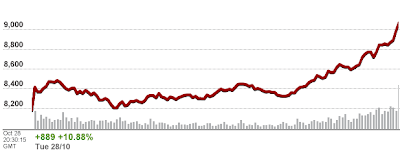
As the FTSE spirals below 4,000, the UK Government intends to use legal action to pursue an estimated £19 billion worth of British cash tied up in Iceland. This is made up of £1 billion owed to UK local government, £6 billion owed to UK individuals and £12 billion owed to UK companies and institutions. The strangest thing is, what were these people and organisations doing relying so heavily on a tiny country?
Iceland has a population of 320,000. The UK's £19 billion represents and investment of almost £60,000 a head. Kent County Council, which represents a population of 1.4 million has £50 million at stake. The truth is emerging that, contrary to earlier reports, ratings agencies were flashing up warnings about Iceland as early as April. However, I would go further. The apparent financial success of Iceland and Icelandic companies - especially their banks - always smelt a little fishy.
Over recent years Icelandic banks such as Kaupthing, Glitnir and Landsbanki have been offering very attractive rates of interest. Generally much better than their UK domiciled equivalents. How could they do this on a long term basis? What intrinsic competitive advantage did they hold over traditional banks. Second, Icelandic investment companies such as Baugur were buying up huge chunks of the British high street with investments in companies such as Iceland (the grocery retailer), Karen Millen, House of Fraser and Hamleys. None of these companies was known to trading any better than their equivalents. But Baugur was awash with cash. Even
West Ham United, a generally under-performing English Premiership football club, has been acquired by Icelandic owners. Who just happens to be connected to Landsbanki.
There's a generally in life, and one especially apt for finance, that if something sounds too good to be true it probably is. The rise of Iceland as an economic power house was too good to be true. The UK people, businesses and local government authorities that have lost money should have used common sense rather than waiting to be told by the ratings agencies that there was something rotten in Iceland.





